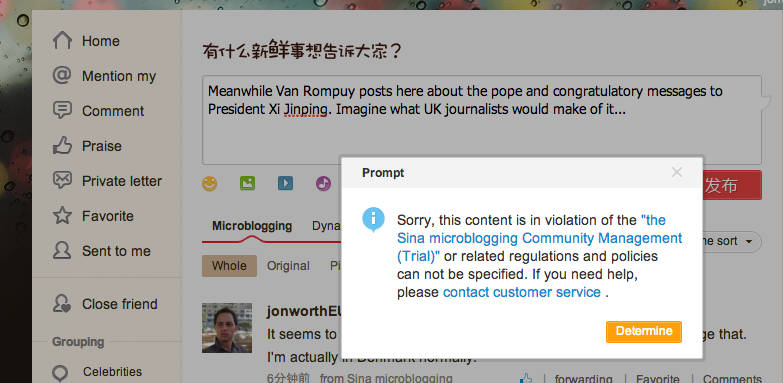Alexander Stubb is there. Herman Van Rompuy is there. So I thought I’d have a go at using the Chinese social network Sina Weibo (Wikipedia | Website).
The first headache is trying to work out how to sign up. I speak no mandarin at all. So Google Chrome with built in Google Translate did the job. Signup with my @jonworth.eu e-mail did not work, but Gmail did. This site assisted me further. In the end I managed to get it to work, and you can find my profile here. The basic impression is that it’s like the website version of Twitter – with a series of added embellishments – it wants me to give relationship status and tell it my blood group. I also managed to set my location to outside China, but it’s now stuck to USA rather than Denmark. Anyway, the basics are more or less set.
But then comes the fun bit: writing on Weibo. My first 2 weibos were tech-related, but the third was:
Meanwhile Van Rompuy posts here about the pope and congratulatory messages to President Xi Jinping. Imagine what UK journalists would make of it…
And this is what happened:

Remove the words ‘Xi Jinping’ and it posts OK. Post a weibo that says “I love Xi Jinping” and that is not allowed either. Basically whatever the rest of the sentence, Xi Jinping is not allowed. And this, remember, is one one of the two largest social networking sites in China.
So, you say, this is China. Get used to it.
Well, yes, but it’s also a lesson for Europe too. With calls to stamp out racism on social networks growing in France, and David Cameron calling for a clampdown on social networks during the UK riots, Europe is not immune to these pressures. Yet as my small Sina Weibo example shows, a machine cannot know if I am being kind to, or undermining a Chinese politician. Likewise a machine cannot clearly analyse if a tweet I write is anti-semitic, or if my social networking activities are likely to cause social unrest. So perhaps my little experiment on Chinese social media today might have some lessons for European politicians. I can only hope.
Also, arbitrary censorship systems are often badly designed for typos or alternative spellings. Try inserting a space or a full stop anywhere in the name or an alternative transcription system such as Wade-Giles (Hsi Chin-ping). I’ve not tried registering an account at Sina Weibo myself, but I know that it is often possible to circumvent censorship that way.
This reminds me of something I read about problems with Google. If your search query included certain characters such as 江 (river) or 周 (week), then your Internet connection would automatically break for five minutes. These two characters are two of the most common Chinese surnames, so they are presumably censored because there presumably are some Chinese dissidents who happen to be called Jiang (江) or Zhou (周), but it also prevents you from searching for other things such as Jiang Zemin (former Chinese president), Zhou Enlai (former Chinese prime minister) and various rivers and weekly publications. Arbitrary censorship is just stupid.